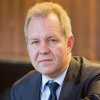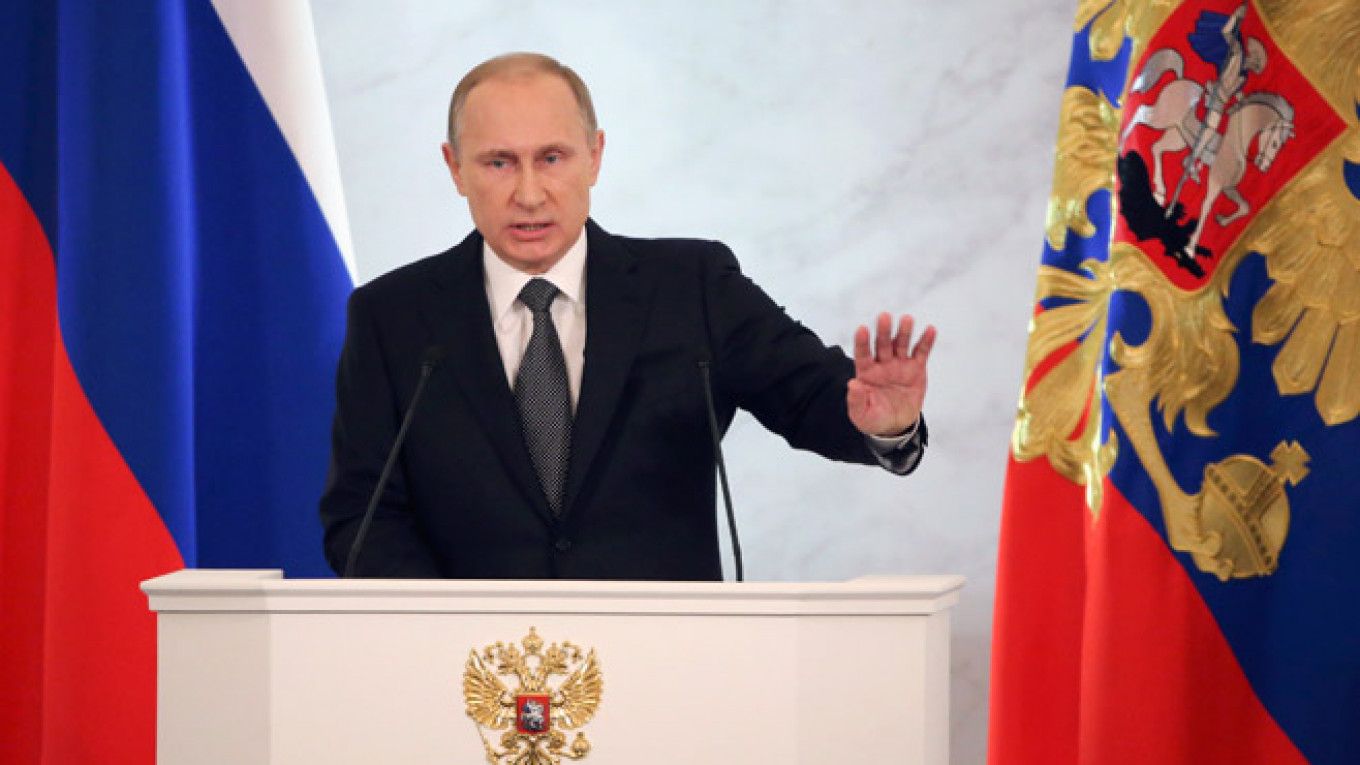Russia and the world waited expectantly for President Vladimir Putin's speech to the Federal Assembly on Dec. 4 — not so much because they expected something earthshaking, but because so many alarming developments have occurred in recent months.
Putin's address was just as colorless as he has looked in recent months. The speech turned out to be an ordinary, periodic event in the political life of the country, akin to the State of the Union address that U.S. President Barack Obama delivered in late January. In fact, a cursory comparison of the two speeches reveals some interesting points.
The American people can have faith that the system works and that these words will lead to the promised actions. Not so in Russia.
What first catches the eye in Putin's address is that the Russian president is clearly a marginal player in the international arena. Although he also spoke of Russia's great history, its sovereignty and power, one-third of his text was devoted to other countries and the actions of foreign powers. He referred to Europe as having practically raped Ukraine, his "American friends" who constantly "restrain" Russia, and Washington's withdrawal from missile defense treaties and the resultant threat to Russia.
By contrast, Obama's speech was entirely focused on his own country — which he said is "better-positioned for the 21st century than any other nation on earth." Obama was less concerned about external factors than he was about domestic issues. He said a few words about Afghanistan, offered the traditional support for democracy in countries from Ukraine to Myanmar — and that was it. Obama had no shortage of things to say about his own country. Putin apparently did — because he does not know Russia.
Second, the two leaders have widely divergent attitudes toward their citizens. Putin spoke of "unity and solidarity," of a "centralized state" and of "national interest." He cited philosopher Ivan Ilyin, who placed "freedom for Russia itself, for its international independence," atop his list of priorities and freedom "for the Russian people" a distant last.
For Putin, the people sitting in the hall before him and all those who live beyond the Kremlin walls are just biomass on the body of the Russian state — which he, alone, embodies. In his speech, Obama mentioned eight Americans he had met during the foregoing year who had impressed him. There was a World War II veteran, a single mother of a large family who had never relied on welfare, a Minneapolis pizzeria owner, a female doctor and even his own wife, Michelle, who had founded a new charitable project.
Third, there is a very noticeable emphasis on process and result. Putin spoke of the need to create new territories for priority development, launch insurance-based health care, grant amnesty to capital returning to Russia, and "escape the trap of zero-level growth." Obama began his speech by proclaiming that unemployment was at a record low for recent years and trumpeting the number of new jobs created and advances in entrepreneurship. He proudly pointed out that the country has improved, in part through his own efforts.
Prior to the start of Putin's third presidential term, the Russian economy had grown by 4.9 percent, as compared with the "zero-level growth" now. But who is to blame for that stagnation? Isn't it the same man who put Russia into that trap? The same man who had nothing to say in his speech about the economic results of his last two years in the Kremlin?
No less absurd was his threat directed at currency speculators, saying "the authorities know who these speculators are. We have the proper instruments of influence, and the time is ripe to use them." Who is supposed to do this? Apparently, anyone but the president.
Everything is different in the United States. Leaders clearly say that a new health care standard will be instituted on such-and-such a date, that such-and-such an agency will provide support for small businesses to a specified sum, and the president thanks Congress for approving the measure. As a result, the American people have faith that the system works and that those words will lead to the promised actions. Not so in Russia.
And amazingly, it was not Putin but Obama who spoke about gas. The U.S. president enthusiastically said that a new investment of $100 billion had given the U.S. economy access to cheap gas, the production of which had risen by almost 30 percent. For his part, Putin only speaks reproachfully about Ukraine and the billions it owes Russia for gas. In fact, that also says a lot about where the two leaders are taking their respective — and not so dissimilar — countries.
Vladislav Inozemtsev is a professor of economics at the Higher School of Economics and director of the Moscow-based Center for Post-Industrial Studies.
A Message from The Moscow Times:
Dear readers,
We are facing unprecedented challenges. Russia's Prosecutor General's Office has designated The Moscow Times as an "undesirable" organization, criminalizing our work and putting our staff at risk of prosecution. This follows our earlier unjust labeling as a "foreign agent."
These actions are direct attempts to silence independent journalism in Russia. The authorities claim our work "discredits the decisions of the Russian leadership." We see things differently: we strive to provide accurate, unbiased reporting on Russia.
We, the journalists of The Moscow Times, refuse to be silenced. But to continue our work, we need your help.
Your support, no matter how small, makes a world of difference. If you can, please support us monthly starting from just $2. It's quick to set up, and every contribution makes a significant impact.
By supporting The Moscow Times, you're defending open, independent journalism in the face of repression. Thank you for standing with us.
Remind me later.








